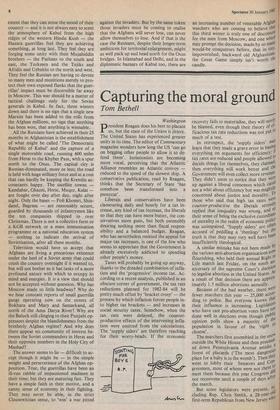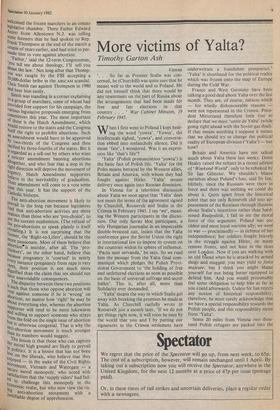Capturing the moral ground
Tom Bethel!
Washington President Reagan does his best to placate us, but the state of the Union is jittery. The United States has experienced greater unity in its time. The editor of Commentary magazine wonders how long the US `can go on begging other people to allow it to de- fend them'. Isolationists are becoming more vocal, perceiving that the Atlantic Alliance resembles an Atlantic convoy reduced to the speed of the slowest ship. A conservative publication, read by Reagan, thinks that the Secretary of State 'has somehow been transformed into a pussycat'.
Liberals and conservatives have been clamouring daily and hourly for a tax in- crease, any kind of tax increase, the liberals so that they can have more butter, the con- servatives more guns, but both ostensibly desiring nothing more than fiscal respon- sibility and a balanced budget. Reagan, who has nevertheless resisted the appeal for major tax increases, is one of the few who seems to appreciate that the Government is already excessively addicted to spending other people's money.
Taxes will probably be going up anyway, thanks to the dreaded combination of infla- tion and the `progressive' income tax. Ac- cording to a recent analysis, published in an obscure corner of government, the tax rate reductions planned for 1982-84 will be pretty much offset by 'bracket creep' — the process by which inflation forces people in- to higher tax brackets — and increases in social security taxes. Somehow, when the tax cuts were delayed, the counter- productive effects of the intervening infla- tion were omitted from the calculations. The 'supply siders' are therefore reaching for their worry-beads. If the economic recovery fails to materialise, they will surelY be blamed, even though their theory of ef- ficacious tax rate reductions was not put to much of a test.
In retrospect, the 'supply siders' JOY learn that they made a grave error in basal everything on arguments for efficiency: I tax rates are-reduced and people allowed to decide things for themselves, they claimed, then everything will work better and the Government will even collect more revenue. They didn't seem to notice that they were up against a liberal consensus which car, not a whit about efficiency but was mightlb concerned about justice and morality. T° those who said that high tax rates were counter-productive the liberals serenely replied that inequality was wrong, and s0 their sense of being the exclusive custodian s of morality in the realm of economic poll° was unimpaired. 'Supply siders' are often accused of peddling a 'theology' but the truth is that they may very well have been insufficiently theological. A similar mistake has not been made by the various anti-abortion organisations noW flourishing, who held their annual Right t0 Life march last Friday, on the ninth all' niversary of the supreme Court's decist°11 to legalise abortion in the United States. As a result of that decision there are apPr°%- imately 1.5 million abortions annually. Because of the bad weather, there were fewer marchers this year — 25,000 accor; ding to police. But everyone knows that their influence is increasing. Legislators, who have cast pro-abortion votes have no done well in elections even though Puhlt opinion polls show a majority of ta'" population in favour of the 'right t° choose'. The marchers first assembled in the snow outside the White House and then proceed ed down Pennsylvania Avenue amidst s forest of placards (`The most dangerous, place for a baby is in the womb'). Then they went to lobby their Senators and C°°- gressmen, most of whom were not there id meet them because this year Congress dlu not reconvene until a couple of days after the march.
But some legislators were present, eluding Rep. Chris Smith, a 28-year" first-term Republican from New Jersey yin' welcomed the frozen marchers in an ornate legislative chamber. There Father Edward Atzert from Allentown N.J. was telling some listeners that he had spoken to Rep. Prank Thompson at the end of the march a couple of years earlier, and had tried to per- suade him to vote against abortion. 'Father,' said the 12-term Congressman, You tell me about theology, I'll tell you about the law.' Not long after that Thomp- son was caught by the FBI accepting a 5,000-dollar bribe in the ABSCAM scandal. 'lids Smith ran against Thompson in 1980 and beat him easily. , Smith was standing in a corner explaining LO a group of marchers, some of whom had Provided free support for his campaign, the various legislative proposals emerging from eftmittees this year. The most important " these is the Hatch Amendment, which ould restore to the states and the Congress itself the right to prohibit abortions. Such an amendment would have to be approved Y two-thirds of the Congress and then .ratified by three-fourths of the states. But it is regarded as a sell-out by others who want a, stricter amendment banning abortions altogether, and who fear that a step in the right direction will deprive the movement of Urgency. Hatch Amendment supporters believe in the inevitability of gradualism. I beir amendment will come to a vote some time this year. It has the support of the Catholic bishops. The anti-abortion movement is likely to Prevail in the long run because legislators f IN that anti-abortion activists are more zealous than those who are 'pro-choice', to u,se the current euphemism. (The refusal of the Pro-abortions to speak plainly is itself r'l ealing.) It is not surprising that the nlirier, the 'Right-to-Lifers', should be the ,"_cire Passionate. Most of them believe that "uortion.is murder, after all. The 'pro- !hoicers', on the other hand, believe that ueeause pregnancy is 'courted' in nearly every instance (pregnancy from rape is very rare), their position is not much more dignified than the claim that sex should not have unavoidable consequences. The disparity between these two positions is such that those who oppose abortion will vote against someone if he is 'wrong' on 4!ortion, no matter how 'right' he may be auout everything else, whereas the abortion s' 1113Porter will tend to be more lukewarm and willing to support someone who strays from the fold on the single issue of abortion but is otherwise congenial. That is why the a-n_ ti-abortion movement is much stronger v 'ran its numbers would suggest.
The lesson is that those who can capture the moral high ground are likely to prevail
Politics. It is a lesson that has not been :ist on the liberals, who believe that they `flJoYed — in the wake of the Civil Rights illovement, Vietnam and Watergate — a sa!cure moral monopoly, who noted with sfaction that the 'supply siders' had fail- d to challenge this monopoly in the economic realm, but who now view the ris- i1.1g anti-abortion movement with a Justifiable degree of apprehension.



































 Previous page
Previous page